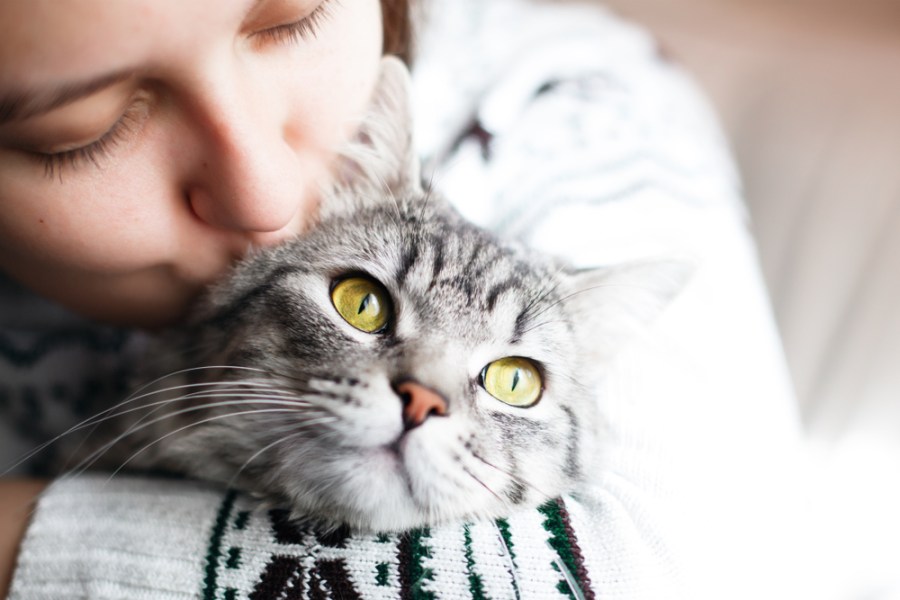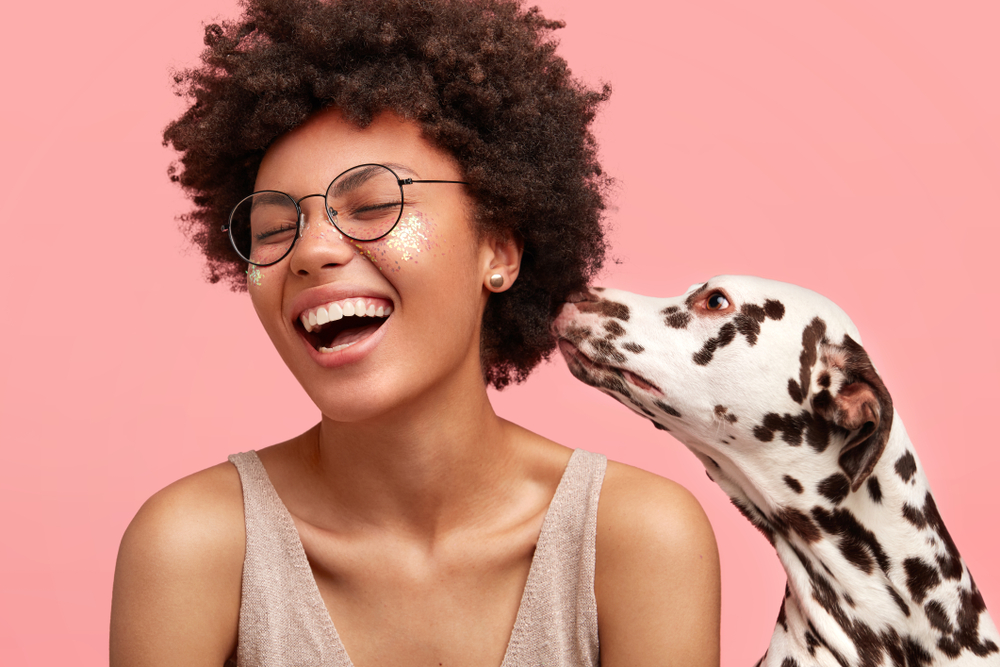As anyone who has a pet will know, dogs, cats and other critters can have an amazing effect on our health. Animals are a real happiness booster – they can help us relax, exercise and get through difficult times.
Running up the hills near her Surrey home, Steph Bishop, 37, and her dog Rufus stop to catch their breath. As Steph lies on the grass, Rufus leaps on top of her, tail wagging enthusiastically. ‘His massive doggy grin makes me feel like the most adored person in the world,’ she says. As Steph attests, the incredible connection between humans and pets can bring unconditional joy. New studies suggest spending time with animals can decrease symptoms of depression and boost levels of the happy hormones dopamine and serotonin.
While 26 per cent of Brits favour dogs, pets of all shapes and sizes offer therapeutic benefits. ‘I am not excluding the healing powers of birds, fish, snakes or three-legged cats,’ says Sophie Rickard, psychologist and contributing author of new book Four Legged Therapy (Aster, £12.99, Amazon.co.uk) ‘We are not all in a position to share our lives with a horse, a dog, or even a hamster, but even the tiniest city rental has space for a window bird feeder – and with it the joy of a friendly face,’ she says.
Nearly half of all pet owners agree their animal companions improve their mood and reduce stress levels, according to a study conducted on behalf of Time 4 Sleep, which might be why 37 per cent of us allow our pet to sleep on our bed.
‘Animals provide a sensory experience similar to a bedtime story. We are in a safe and calm environment, snuggled up to a warm and often fluffy creature. Just the fact we are touching another living being provides comfort. There is no judgement, no expectation, just a moment of togetherness,’ says Sarah Mackie, writer and area co-ordinator at Pets as Therapy.
‘We help physiotherapists working with elderly people with arthritis. When a dog is present, the atmosphere changes. Petting a dog is infinitely more pleasurable than squeezing, say, a therapy ball, so patients look forward to sessions. From children with ADHD to adults with physical and mental health challenges, I’ve seen animals improve people’s wellbeing in minutes.’
Animals can help ease depression
Pets can significantly relieve symptoms of depression, according to a recent Portuguese study in which participants who looked after dogs or cats found their lives less affected by the condition, compared to a control group who did not own a pet. With 64.7 million prescriptions written out for anti-depressants in 2016, could some people find pets, not pills, are the answer? ‘Research has shown contact with animals has a positive
impact on our sense of flourishing and finding meaning and purpose in life.
Animals offer a soothing presence and a positive distraction from ruminating thoughts, they promote the power of touch and encourage responsibility – and responsibility promotes self-esteem, independence and positive mental health,’ says Dr Lorna Brocksopp, positive psychology and wellbeing consultant.
‘My research with the charity Guide Dogs showed the human-animal bond served as a “buffer” to symptoms of depression in people who were blind or partially sighted, and my postdoctoral investigations into happiness and wellbeing concluded that cultivating a relationship with animals, as well as the natural world more generally, can bring a sense of inner peace that rivals any “happy pill”.’
For Rebekah Prince, 40, from Essex, her cats helped her cope during a lonely, depressing time. ‘When I was 20, my boyfriend was in an accident and while he was in intensive care, I felt extreme sadness and desperation. My cats, Elvis and Priscilla, were there for me. Elvis would lie on my chest as I sobbed myself to sleep. It was a long, dark time and my cats saved me,’ she says.
‘It’s not that I’d have hurt myself, but they gave me strength and reminded me I am loved and never alone. I have eight rescue cats now. They’ve made me the kind, compassionate and happy person I am today. My latest rescue, Freddie, is so playful, if I’m sad his kisses make me smile. He makes me want to live more like him – enjoying the game of life.’
Pets calm us down
Many therapists find that offering patients time with an animal during therapy can make the process less daunting and more effective. ‘Animals enhance and deepen the client-therapist relationship. Stroking an animal calms us down, takes our mind off our anxieties and helps build empathy. Animals are not judgemental – they love you no matter your mood, how you look or how much money you have. They don’t hold grudges and every day is a new and exciting time of possibilities, which can be infectious and educative. They place their trust and belief in us. How many of us feel even our closest friends or family do that?’ says Professor Sarah Niblock, chief executive of the UK Council for Psychotherapy.
‘Some people feel rescued animals have an even closer relationship with their “humans” and I agree. I have two rescue greyhounds, both of whom led tough lives and hadn’t experienced human love, even to the point of not having their own names. We’ve gone on a profound journey together. And you don’t have to commit to owning a pet. People often need dog walkers or cat sitters and animal shelters are desperate for volunteers.’
Combining the merits of animal therapy with yoga has seen a rise in popularity, in particular ‘goat yoga’. At Dartington Dairy Farm in Totnes, Devon, Donna McCheyne runs bespoke classes from April to October (simplysoulful.co.uk). ‘Yoga unites us with ourselves and all beings on Earth, and thus unites all creatures. Goat yoga enhances this connection,’ says Donna, a qualified animal yoga instructor. ‘It combines the physical and emotional benefits of yoga with animal therapy and laughter, which is a great way to release endorphins, naturally triggering a positive feeling. Yogis leave goat yoga with a bounce in their step and beaming smiles. Every session is unique but there’s always nibbles and giggles,’ says Donna.
Pets are fab for keeping us fit
Pet owners do double the amount of exercise, raising their heart rate five times a week compared to just three for non-pet owners, according to a survey conducted through OnePoll.com. Dogs force people to be physically active and into new social situations, according to the Portuguese study. It’s something Steph Bishop was craving and achieved thanks to Rufus.
‘I was mum to Lily, five, and Fraser, two, when my husband Ben and I moved to a new village. I work from home as a property manager while Ben is a banking project manager. Alone and isolated, I lost all confidence. I felt anxious throwing myself into new situations and needed something to change,’ she says.
‘When I first found out about Canicross – running with your dog – it took me a year to build up the courage to join a local group. But when Rufus and I tried it, we were hooked. I run with him attached to a waist belt and it’s given us an intuitive connection I’ve never felt with a dog before. He trusts me, which helps him approach situations other dogs might be apprehensive about, like our recent Muddy Dog obstacle race. Two years on, I’ve never been happier or fitter. I’ve just completed a 100km ultramarathon and Rufus and I plan to run a marathon together next year. Running is never a chore – it’s a fun, bonding experience. Rufus loves it so much and it makes me happy to make him so happy. Together we’ve made new friends through Canicross and last year I qualified as a certified instructor because I want to help more people discover the enjoyment of exercising with their dog.’
Dog owners live longer
If the rewards are not numerous enough already, dog owners are more likely to live longer, healthier lives too, according to a 2017 study of more than 3.4 million people. The Swedish study revealed dog owners had a lower risk of dying of cardiovascular disease and other causes, than those who did not own a dog, even after adjusting for factors such as smoking. Other studies have shown that stroking a furry animal can boost oxytocin levels, the hormone responsible for decreasing blood pressure and boosting immunity.
Animals help reduce stress
For Cath Jones, 45, from Caerphilly, the demands of a career as a headteacher contributed to her determination to pursue a stress-free life after battling cancer.
‘For 10 years I had no time for family, my weekends were lost to catching up with work, my evenings spent at the computer, my nights sleepless from stress. Our dog Beau Jangles was just a puppy when I was diagnosed with breast cancer in December 2012.
‘Beau was my chemo buddy. He gave me a reason to get up and no matter how awful I felt, I wanted to make his life good. We’d walk together every day and when I was exhausted, he’d lie calmly beside me, giving cuddles. I had triple negative breast cancer, which is usually caused by the BRCA gene. When I tested negative for the faulty gene, I was told the stress hormone cortisol was the next biggest contributing factor. It
was a no-brainer – after treatment finished in August 2013, I started a dog-walking business, Jangles Home Boarding and Day Care. Beau’s still by my side and we have three more dogs now. Even stomping through mud in the pouring rain, I’ve never been happier. I’ve lost weight, I sleep soundly, I feel amazing, I have zero stress in my life, just a lot of boundlessly energetic dogs who think puddles and bluebells are the greatest adventures in the world.’
- Now read: the health benefits of cycling
- How to get up early to work out










